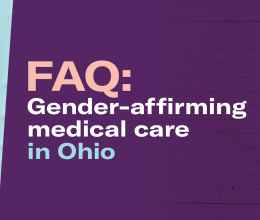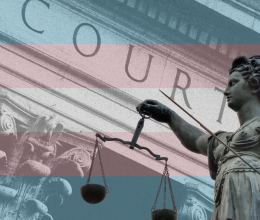Two individuals, James Obergefell and John Arthur James filed a lawsuit challenging the state’s refusal to recognize same-sex marriage on death certificates. The two were legally married in Maryland in 2013. Mr. Arthur, who suffered from a terminal illness, died several months after litigation began. Due to Ohio law, under both the Ohio Constitution and the Ohio Revised Code, plaintiffs believed that state officials would refuse to indicate Mr. Arthur was married at the time of his death and that Mr. Obergefell was his spouse.
The plaintiffs filed the case on July 19, 2013 in the United States District Court for the Southern District of Ohio, and the case was assigned to Judge Timothy S. Black. The original defendants were Governor John Kasich, Attorney General Mike DeWine and Registrar of the City of Cincinnati Health Department, Office of Vital Records, Dr. Camille Jones. On July 22, 2013, Judge Black granted a temporary restraining order that required the state to recognize the marriage of Mr. Obergefell and Mr. Arthur on Mr. Arthur’s death certificate.
On September 26, 2013, the plaintiffs filed an amended complaint adding two additional plaintiffs, David Michener and Robert Grunn. Mr. David Michener had also married his same-sex partner in 2013. Mr. Michener’s spouse passed away nearly a month later. The third plaintiff, Robert Grunn, is a licensed funeral director who operates his business in Cincinnati. Mr. Grunn, whose clients included married gay couples, feared prosecution for making false statements on a death certificate, if he were to classify a legally married same-sex couple as wedded spouses.
The plaintiffs’ amended complaint named as defendants Dr. Camille Jones, Registrar of the City of Cincinnati Health Department, Office of Vital Records, and Dr. Theodore Wymyslo, the Director of the Ohio Department of Health.
In the amended complaint, the plaintiffs sought a declaration from the court that Ohio’s practice of denying recognition of marriages lawfully performed in other states on death certificates is unconstitutional and requested an injunction to stop this practice.
On December 23, 2013, Judge Black held that Ohio’s refusal to recognize same-sex marriages performed in other states violates the substantive due process and equal protection rights of the parties to those marriages.
Judge Black also declared the ban on recognizing same-sex marriages legally performed outside Ohio to be unconstitutional and prohibited the State from enforcing the ban on the plaintiffs. Wymyslo appealed the case to the Sixth Circuit Court of Appeals.
Legal Theory
The state’s refusal to recognize same-sex marriages lawfully performed out of state on death certificates violates due process and the Equal Protection Clause of the Fourteenth Amendment. The right to have one’s marriage recognized by the state is a fundamental liberty interest protected by due process, and the state cannot infringe this right without substantial justification. Ohio cannot assert a substantial, or even rational, justification for its refusal to recognize same-sex marriages.
Further, the state’s refusal to recognize these marriages violates the Equal Protection Clause. Ohio recognizes marriages of opposite sex individuals lawfully performed in other states that would otherwise have been illegal to perform in Ohio. However, Ohio does not recognize same-sex marriages that are lawfully performed in other states. Ohio’s inconsistent treatment of recognizing marriages performed in other states violates the Equal Protection Clause because the state cannot justify its unequal treatment by any rational or legitimate basis.
Status Update
Defendant Wymyslo filed his notice of appeal to the Sixth Circuit Court of Appeals on January 16, 2014, and on April 10, 2014, filed his Appellant Brief.
Shortly after Appellant’s brief was filed, Mr. Lance Himes was substituted for Dr. Wymyslo, as Dr. Wymyslo stepped down as the Director of the Ohio Department of Health and Mr. Himes took his place as Interim Director. Richard Hodges replaced Mr. Himes as Defendant after being appointed Director of the Ohio Department of Health in August 2014.
On April 24, 2014 Appellee Obergefell filed the Appellee Brief. Appellant Himes filed a Reply Brief on May 12, 2014. During this period, numerous amicus briefs were filed to support each side. Oral arguments took place on August 6, 2014. On November 6, the Court of Appeals reversed the decision. Judge Sutton wrote the opinion of the court, in which Judge Cook joined. Judge Daughtrey dissented.
On November 14, 2014, Obergefell filed a Petition for a Writ of Certiorari with the U.S. Supreme Court. On January 16, 2014, the U.S. Supreme Court issued an order granting certiorari and agreeing to hear the case. In its order, the Supreme Court consolidated this case with other Sixth Circuit cases challenging same-sex marriage restrictions. The Court ordered that each party brief one of two issues that pertain to its respective case: 1) Whether the Fourteenth Amendment requires a state to license a marriage between two people of the same sex; and 2) Whether the Fourteenth Amendment requires a state to recognize a marriage between two people of the same sex when their marriage was lawfully licensed and performed out of state.
This case addresses the second question, and we filed our merit brief on February 27, 2015. The respondents’ briefs were filed on March 27, 2015, and our Reply brief was filed on April 17, 2015. The case was heard on April 28, 2015.
On June 26, 2015, the United States Supreme Court ruled in a landmark decision that the 14th Amendment requires all states to license marriages between same-sex couples and to recognize all marriages that were lawfully performed out of state.






